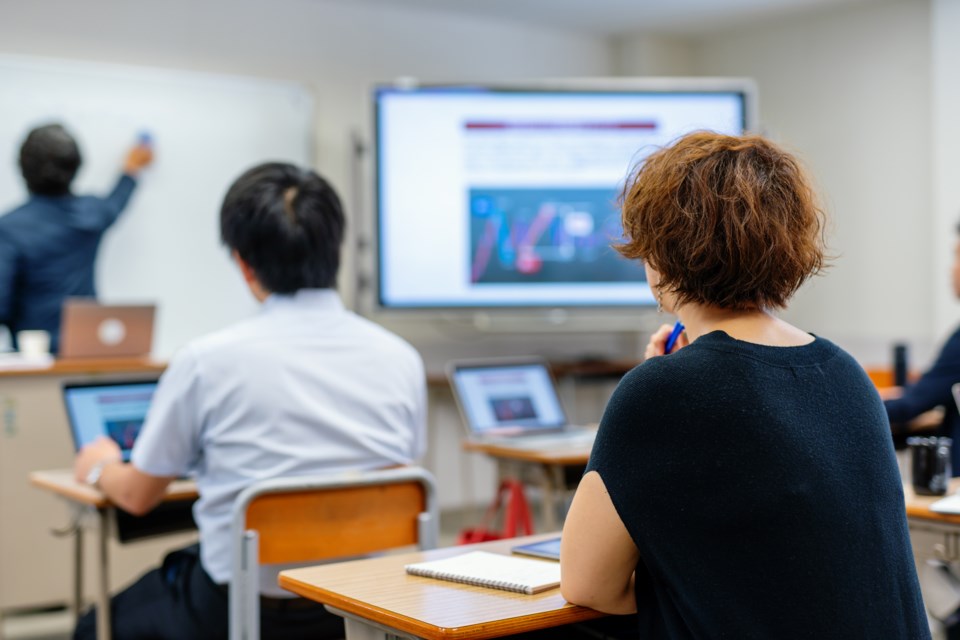The Whistler Institute had an ideal structure in mind for its Global Perspectives Speaker Series before its official launch—but that was before COVID-19 intervened. Now, after nearly four years and about a half-dozen successful speaking events, the series is picking up steam and aligning with that original vision for the first time this fall.
“We’ve had a bit of a hiatus caused by the pandemic, so what we had hoped would be a very regular speaker series is only really getting started this year, as in multiple events,” said Whistler Institute’s executive director Suki Cheyne.
Since its first event discussing the electric vehicle economy in November 2019, the series has brought renowned experts to the resort once or twice a year to delve into topics like tourism, the climate emergency, housing, the Olympic movement and even the potential impacts of autonomous vehicles in Whistler.
The series’ primary goal is “to stimulate discussion and inspire action around global topics with a local impact,” according to Cheyne. It’s a fitting objective for an organization that has worked to develop innovative educational opportunities in Whistler and the Sea to Sky corridor since its establishment in 2015.
So, after the events planned for 2020 were scrapped, “we experimented with various different hybrid and online versions of the events during the pandemic and as we came out, and then we’ve slowly been building capacity to the point where we can actually put on more than one event a year,” she added. “Now we have four planned.”
The idea was always for the series to follow the traditional academic year, said Cheyne, with numerous speaking events taking place between September and June. “It might vary from year to year, but two in the fall and two in the spring would be perfect,” she explained. “This is our first iteration of this plan.”
On tap for the Whistler Institute’s Global Perspectives Speaker Series this fall is a Sept. 28 discussion about “The Asian Century, And What Comes Next,” followed by an Oct. 26 talk exploring “Higher Education: The Next Paradigm.” The 2023-24 speaker series will also include two discussions—set to focus on concussions and health-care, respectively—scheduled for the spring.
First, the institute will welcome Paul Evans, professor emeritus at the University of British Columbia’s School of Public Policy and Global Affairs, to Whistler later this month to discuss how Canada can navigate the economic, diplomatic, and moral challenges stemming from China’s continued rise as a global powerhouse.
Then, Capilano University’s president and vice-chancellor Paul Dangerfield will take to the Global Perspectives stage to discuss the rapidly-changing landscape of higher education. Audiences can expect Dangerfield to speak to several of the factors bringing about those changes, from artificial intelligence and the climate crisis, to equity and diversity, truth and reconciliation, shifting demographics, and polarized politics.
A committee of Whistler Institute volunteers is responsible for brainstorming, researching, and eventually determining the Global Perspectives Speaker Series’ topics, in addition to securing experts to speak. Despite the fact that both concepts up for discussion this fall have been on volunteers’ radars for “awhile now,” said Cheyne, both are even timelier and more relevant to the corridor than the committee could have predicted.
“Having Paul Dangerfield come and speak about the future of higher education, that’s been on our hit list for a long time—how education is evolving, especially during the pandemic with the introduction of technology, and artificial intelligence post-pandemic, and what does that look like for education?” she explained. That was before Capilano University’s Aug. 16 announcement of its plans to purchase the former Quest University lands and buildings in Squamish, Cheyne pointed out.
As for Evans’ area of expertise, exploring how global influences on the economy could trickle down into tourism had long been a topic of interest for the institute.
Previous speaker series events focused more on identifying actions Whistlerites could take at the local level, “but I think in this case, it’s more informing the local community about what’s happening globally, and then providing a bit more context on what that looks like in terms of local impact,” she added.
Both speaker series events will take place at Whistler’s Maury Young Arts Centre starting at 6 p.m. Each event will include an audience Q&A, followed by a cocktail reception in the lobby where audience members can continue the discussion in a more relaxed setting. Tickets for both events are available online, offered at $30 each for the theatre discussion only, or $135 for anyone who’d like to continue the discussion over an intimate, three-course set-menu at Quattro Restaurant immediately following the event.
The Whistler Institute is currently accepting sponsors for both of this fall’s events, or for the Global Perspectives Speaker Series as a whole.
“The series performs two functions,” Cheyne explained. “One, it’s educational, and it brings thought leadership into the community, but it also acts as a fundraising vehicle for us so that it can fund other programs and research and development that we’re doing throughout the year.”
For more information or to purchase tickets, head to whistlerinstitute.com.




